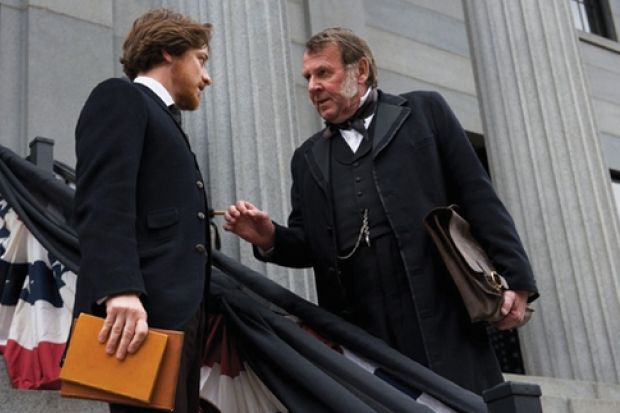The Conspirator
Directed by Robert Redford
Starring Robin Wright, James McAvoy and Kevin Kline
Released in the UK on 1 July
Robert Redford and Clint Eastwood: two men of the same generation - one known for his liberal politics, the other for his conservatism (although both advocate environmental protection). They are stars turned directors; in the latter role, Eastwood's failing lies in his weakness for romance and melodrama, perhaps because they were popular when he was growing up. Although Redford has directed fewer films (eight to Eastwood's 35), he seems to me the more expert. Where Eastwood is a sentimental old windbag, Redford is an economical storyteller, less prone to the kind of silliness to be found in such films as Eastwood's Hereafter (2010).
Redford's latest film tells the story of Mary Surratt (played by Robin Wright), the only woman implicated in the plot to assassinate Abraham Lincoln, and of the man who defended her at the court martial that determined her fate - Frederick Aiken, a -year-old Civil War hero (James McAvoy). The Conspirator traces the efforts of Secretary of War Edwin Stanton (Kevin Kline) to deprive her of the civil trial that would likely have seen her acquitted.
This is restrained drama, scrupulous in its reconstruction of the period and the turbulence of the times. "Damn the rebels, damn them all to hell!", says one character, a remark that gives the sense that behind everything - the assassination, the botched tribunal and the corruption that underpinned it - lay the enmities of war.
At its heart is a show trial. McAvoy is effective as the inexperienced attorney who provides counsel to a woman whose sympathies lie with the defeated Confederate side. As a Unionist captain, Aiken is the most reluctant of participants in her defence, but he soon realises that the real conspirator in Surratt's family is her son John, and Aiken comes to stake everything on his drive to win her a fair trial. McAvoy's scenes with Wright, and with Danny Huston as the prosecution lawyer, serve as a central motor to the film.
As with all courtroom dramas, The Conspirator has its complications. It helps to understand the separation of powers within the American context, and to have some idea of the jurisdiction of judges over politicians. That such a demanding film works so well is a testimony both to the clarity of James Solomon's script and to the quality of the supporting cast, which includes John Cullum, Stephen Root, Colm Meaney and Tom Wilkinson. These seasoned character actors make The Conspirator a pleasure to watch.
I have two reservations about this film. The first is technical. Most of the drama is photographed through a soft-focus lens, as though it were an extended Flake commercial. Why Redford decided on this approach one can only speculate. It can have nothing to do with the clear-focused quality of 19th-century photographs. Perhaps it is connected to the evocation of Washington DC at the time - which (owing to the fact that the film was shot in Savannah, Georgia) here looks more like Paris. Or perhaps it has something to do with making the drama look "old"; whatever the rationale, it is a constant distraction.
My other reservation is with the film's politics. Its closing captions frame its story as something possible only during a brief moment in US history, until Congress determined a few years later that civilians could not be tried by soldiers. It suggests also that the failure of a civilian court to convict Surratt's son (who was more implicated in the assassination than his mother) indicates that an identical court would have exonerated her.
In other words, the film wishes us to understand that the fate of Surratt was an exceptional event against which the US Constitution guarantees. Except that it doesn't. Foreign civilians were for years tried by members of the US military at a place called Guantanamo Bay, in closed courts. The constitution failed Surratt, and there is nothing to prevent it failing again: in other words, her tale is correctly regarded as cautionary and by no means unique.
The film's complacency on this matter is all the more surprising given Redford's sophistication: he has appeared in a film about another, latter-day president whose conduct was unconstitutional (All the President's Men, 1976); in one that posed uncomfortable questions about the legality of such organisations as the CIA (Three Days of the Condor, 1975); and in a third that queried the integrity of the electoral system (The Candidate, 1972).
Be this as it may, the piece is well conceived, the acting superb and Redford's direction solid. Such episodes as the one with which the film opens, switching back and forth between the scene of Lincoln's assassination and a party taking place nearby, make The Conspirator a memorable drama whose heart is in the right place, smugness aside.
Register to continue
Why register?
- Registration is free and only takes a moment
- Once registered, you can read 3 articles a month
- Sign up for our newsletter
Subscribe
Or subscribe for unlimited access to:
- Unlimited access to news, views, insights & reviews
- Digital editions
- Digital access to THE’s university and college rankings analysis
Already registered or a current subscriber? Login
